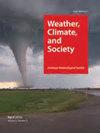An Information-Theoretic Approach to Reconciling Historical Climate Observations and Impacts on Agriculture
IF 1.9
4区 地球科学
Q3 ENVIRONMENTAL STUDIES
引用次数: 0
Abstract
Decision-makers in climate risk management often face problems of how to reconcile diverse and conflicting sources of information about weather and its impact on human activity, such as when they are determining a quantitative threshold for when to act on satellite data. For this class of problems, it is important to quantitatively assess how severe a year was relative to other years, accounting for both the level of uncertainty among weather indicators and those indicators’ relationship to humanitarian consequences. We frame this assessment as the task of constructing a probability distribution for the relative severity of each year, incorporating both observational data – such as satellite measurements – and prior information on human impact – such as farmers’ reports – the latter of which may be incompletely measured or partially ordered. We present a simple, extensible statistical method to fit a probability distribution of relative severity to any ordinal data, using the principle of maximum entropy. We demonstrate the utility of the method through application to a weather index insurance project in Malawi, in which the model allows us to quantify the likelihood that satellites would correctly identify damaging drought events as reported by farmers, while accounting for uncertainty both within a set of commonly used satellite indicators and between those indicators and farmers’ ranking of the worst drought years. This approach has immediate utility in the design of weather-index insurance schemes and forecast-based action programs, such as assessing their degree of basis risk or determining the probable needs for post-season food assistance.调和历史气候观测及其对农业影响的信息理论方法
气候风险管理的决策者经常面临如何协调关于天气及其对人类活动影响的各种相互冲突的信息来源的问题,例如当他们确定何时根据卫星数据采取行动的定量阈值时。对于这类问题,重要的是定量评估某一年相对于其他年份的严重程度,同时考虑到天气指标之间的不确定程度以及这些指标与人道主义后果的关系。我们将这一评估定义为构建每年相对严重程度的概率分布的任务,将观测数据(如卫星测量)和关于人类影响的先前信息(如农民报告)结合起来,后者可能是不完全测量或部分排序的。我们提出了一种简单的、可扩展的统计方法,利用最大熵原理拟合任意有序数据的相对严重性概率分布。我们通过马拉维的一个天气指数保险项目展示了该方法的实用性,在该项目中,该模型使我们能够量化卫星正确识别农民报告的破坏性干旱事件的可能性,同时考虑到一组常用卫星指标内以及这些指标与农民最严重干旱年排名之间的不确定性。这种方法在设计天气指数保险计划和基于预报的行动方案方面具有直接效用,例如评估其基本风险程度或确定季后粮食援助的可能需求。
本文章由计算机程序翻译,如有差异,请以英文原文为准。
求助全文
约1分钟内获得全文
求助全文
来源期刊

Weather Climate and Society
METEOROLOGY & ATMOSPHERIC SCIENCES-
CiteScore
3.40
自引率
13.60%
发文量
95
审稿时长
>12 weeks
期刊介绍:
Weather, Climate, and Society (WCAS) publishes research that encompasses economics, policy analysis, political science, history, and institutional, social, and behavioral scholarship relating to weather and climate, including climate change. Contributions must include original social science research, evidence-based analysis, and relevance to the interactions of weather and climate with society.
 求助内容:
求助内容: 应助结果提醒方式:
应助结果提醒方式:


